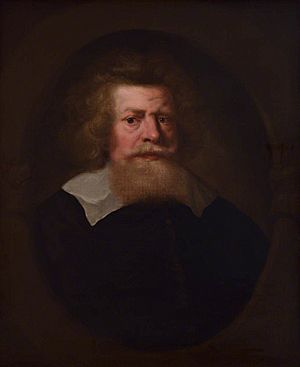William Dell facts for kids

William Dell (around 1607–1669) was an English church leader and teacher. He was the head of Gonville and Caius College, Cambridge from 1649 to 1660. Dell was also a strong supporter of the Parliamentary side during the English Civil War. He wanted big changes in society and the church.
Contents
Early Life and Army Role
Dell was born in Bedfordshire, England. He studied at Emmanuel College, Cambridge, and earned his Master's degree in 1631.
Later, he became a chaplain, or religious leader, in the New Model Army. This army was fighting for Parliament. Being a chaplain in the army meant he shared his strong, new ideas about religion with many people.
Dell and Parliament
William Dell was not afraid to speak his mind, even to powerful people. In 1646, he gave a sermon, or religious speech, to the House of Commons in Parliament. This speech was considered very extreme.
He criticized the Westminster Assembly, a group trying to reform the church. He also spoke up for poor people and told politicians to stay out of religious matters. Because of his strong words, the House of Commons told him off.
Despite this, the Rump Parliament later chose him to lead Caius College. In 1653, some people wanted him to preach again, but the idea was voted down.
Dell also criticized those on Parliament's side who had become rich from the war. He believed they were becoming too greedy and ambitious.
He supported John Crook, a Quaker, to become a Member of Parliament. He also backed John Okey, who was involved in the king's execution. Dell was a supporter of Oliver Cromwell, a powerful leader. However, in 1657, Dell and Okey spoke out against the idea of making Cromwell king.
Dell's Beliefs
Dell was a friend of John Bunyan, a famous writer, and invited him to preach in his church. Dell believed in "free grace," meaning God's favor is freely given, not earned. He also believed in "continuous revelation," which means God continues to reveal new truths to people.
He was against forcing everyone to worship in the same way. He thought people should have freedom in their religious practices.
Ideas for Change
William Dell wanted to see major changes in how things were run, especially in education and the church.
Education Reform
Dell strongly criticized the traditional university system. He thought it was too focused on old ideas from thinkers like Aristotle. He believed in more practical studies.
He suggested a new system of education that was not controlled by the church. He wanted local village schools and grammar schools in bigger towns. He also thought that training for church leaders should be available to more people, not just those who went to traditional universities.
Church and Society
Dell was a harsh critic of the Church of England. He questioned if a national church was truly supported by the Bible. He even chose to be buried outside of the church.
He believed that church leaders should come from all parts of society, not just the wealthy or educated. He also had views similar to the Levellers, a group who wanted more equality. He was against monarchy (rule by a king or queen) and tithes (taxes paid to the church).
After the King Returned
After the king returned to power in 1660, Dell lost his position at Yelden in 1662, which he had held since 1642. A pamphlet he wrote in 1667, called The Increase of Popery in England, was stopped from being published. It finally appeared in 1681.
Images for kids
 | Bessie Coleman |
 | Spann Watson |
 | Jill E. Brown |
 | Sherman W. White |


